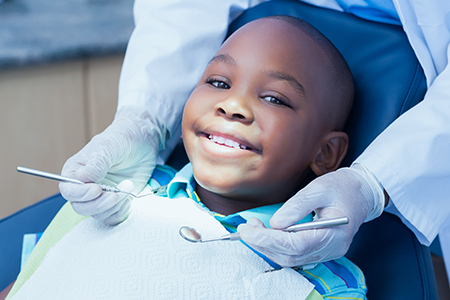
At the office of Cosmetic Micro Dentistry, we prioritize the health, growth, and confidence of every child's smile. Our pediatric services are built around prevention, thoughtful education, and age-appropriate care so families can feel confident their child is developing a strong foundation for lifelong oral health.

Healthy dental habits begin long before a child’s permanent teeth appear. Our team works with parents to establish routines that fit each family's lifestyle — from gentle cleaning techniques for infants to supervised brushing and flossing as children gain independence. Early guidance helps prevent common problems and sets expectations that make dental care a normal part of daily life.
Preventive strategies are at the heart of pediatric care. We emphasize regular checkups, timely cleanings, and protective measures such as fluoride varnishes and sealants when appropriate. These steps reduce the chance of decay and make future treatments simpler and less stressful for both child and parent.
Equally important is creating a welcoming environment where children feel safe and understood. Our clinicians explain procedures in clear, reassuring language and use gentle techniques designed to keep visits calm. When kids are comfortable, they’re more likely to cooperate and develop a positive attitude toward lifelong oral health.
A typical pediatric appointment combines a careful clinical exam, a professional cleaning, and age-focused education. We review health history and growth milestones, evaluate tooth eruption and bite relationships, and screen for early signs of issues like decay or enamel wear. Every visit is tailored to the child's developmental stage and emotional needs.
Cleaning appointments remove plaque and buildup with tools and techniques suited to smaller mouths, followed by polishing and a discussion of at-home care. For children at higher risk of cavities, we recommend additional protective measures and explain how they work so families can make informed choices for prevention.
When diagnostic images are necessary, we use low-dose digital radiography to examine areas not visible to the naked eye. These images help detect early decay, monitor root development, and guide decisions about space maintenance or timing for future treatments — all while minimizing exposure and keeping safety a top priority.

Regular dental exams give clinicians the opportunity to track development and intervene early when concerns appear. Conditions such as misaligned bites, enamel defects, or early cavities are easier to treat when detected promptly. Preventive care also reduces the need for more invasive procedures later on.
Dentists assess the teeth, gums, jaw function, and oral tissues at each appointment, noting how the bite and facial structure are evolving. This ongoing review helps identify whether orthodontic evaluation may be helpful and supports coordinated care with specialists when indicated.
Routine visits also reinforce good habits in a supportive setting. Children receive gentle instruction on brushing, flossing, and healthy choices — and parents leave with practical strategies to make oral care a consistent, manageable part of family life.
Tooth decay remains one of the most common pediatric health concerns, but it is largely preventable. Decay develops when plaque bacteria metabolize sugars and produce acids that erode enamel. Frequent exposure to sugary snacks and drinks increases risk, as does inconsistent brushing.
Prevention focuses on reducing bacterial challenges and strengthening enamel. That includes parent-supervised brushing with a smear of fluoride toothpaste for young children, limiting sugary or sticky foods, and using professionally applied fluoride varnish or sealants when appropriate to protect vulnerable chewing surfaces.
Introduce dental care early and make it part of the daily routine.
Keep baby teeth clean by wiping gums and using an age-appropriate brush as teeth erupt.
Avoid letting infants fall asleep with bottles of milk or juice; offer water instead.
Schedule and keep regular checkups so issues are caught and managed early.
Model and encourage consistent brushing and flossing to build lifelong habits.
Choose nutritious snacks, limit sugary beverages, and prioritize water between meals.
Help children transition away from pacifiers and thumb-sucking at appropriate ages to avoid bite changes.
Ensure athletic children use a properly fitted mouthguard for contact or high-risk sports.

Even before a child’s first birthday, there are meaningful steps parents can take to support oral health. Gentle gum wiping after feedings, avoiding prolonged exposure to sugary liquids, and introducing a soft-bristled toothbrush when teeth emerge all reduce risk and prepare little ones for future dental visits.
The American Academy of Pediatric Dentistry recommends an early dental visit around the first birthday. This initial appointment is an opportunity to answer questions about teething, feeding habits, and enamel protection, and it helps children become familiar with the dental office setting in a calm, low-pressure way.
Teething can be uncomfortable but is rarely cause for alarm. Simple soothing measures — cool teething rings or clean, damp cloths — often help. If parents are ever unsure, a quick call to the office can provide guidance and reassurance tailored to the child’s symptoms.
As children grow, their dental needs change. Baby teeth make room for permanent teeth, chewing patterns evolve, and habits such as thumb-sucking or tongue thrusting can influence alignment. Monitoring these transitions ensures timely guidance and, when necessary, early referral to an orthodontic specialist.
Behavioral and social changes during school years and adolescence can also affect oral health choices. We work with families to address topics like sports safety, oral appliances, and how to balance independence with ongoing parental supervision of hygiene practices.
When dental injuries occur — from playground tumbles or sports incidents — prompt attention is important. Our team provides calm, practical emergency care aimed at preserving teeth, reducing discomfort, and preventing complications whenever possible.
Successful pediatric dental care combines prevention, education, and close monitoring of growth. Regular exams allow clinicians to spot early trends and recommend interventions that minimize future complexity — whether that means targeted sealants, space maintenance, or simply reinforced home care strategies.
Good nutrition and consistent hygiene are pillars of a healthy mouth. Encouraging balanced meals, limiting sugary snacks and beverages, and ensuring children brush and floss properly support not only dental health but overall well-being as they grow into their teen years.
Our office provides a roadmap for each stage of development so families know what to expect and how to help children develop confident, resilient smiles. We blend clinical experience with a gentle, supportive approach to make dental care a positive part of growing up.
Beyond teeth, pediatric dentists monitor facial growth and jaw development because these factors influence bite, breathing, and long-term dental function. Early observation can reveal patterns that benefit from timely intervention or simple monitoring, depending on the child’s needs.
A nutritious diet supports enamel strength, jaw development, and general health. Foods high in sugar or sticky textures increase decay risk, while nutrient-dense choices promote healthy tissues and aid recovery from minor injuries. Small changes in daily eating habits can yield big improvements in oral resilience.
In summary, thoughtful pediatric dental care focuses on prevention, education, and developmentally appropriate treatment to help children thrive. The team at the office of Cosmetic Micro Dentistry is committed to making each visit informative, comfortable, and tailored to your child’s needs. Contact us to learn more about our pediatric services and how we can support your family’s oral health.
A pedodontist is a dentist who has received advanced specialty training in meeting the dental needs of children from infancy to adolescence. Pedodontists, also referred to as "pediatric dentists," study child psychology, behavior management, caring for children with special needs, methods of handling oral/facial trauma, and various techniques for providing anesthesia and sedation. Pedodontists also understand the complexities of facial growth and development and have the clinical skills required to meet the dental needs of all children at every stage of development. Most of all, pedodontists are passionate about what they do and enjoy working with children. They strive to make every dental experience a positive one as they help children establish a strong foundation for good oral health.
Even before your child is born, their first set of teeth is already forming. In fact, by one year of age, some of your baby's front teeth will have already come into place. While the arrival of your baby's first teeth is only one of many developmental milestones, it represents an excellent time to begin a program of oral care. According to recommendations from the American Dental Association, babies should see the dentist around the time of their first birthdays.
Your baby's first teeth typically begin to appear in the 6 to 12-month range. While this is an extraordinary milestone, you need to be aware that your baby may find the experience a little bit uncomfortable. Teething can make babies feel irritable. They may be fussy, have trouble sleeping, not want to eat, and drool quite a bit.
Although you are powerless to speed up the process of teething, there are a few things that you can do to soothe your baby as the new teeth are erupting into place. Common approaches to helping your baby feel more comfortable while getting new teeth, include teething rings or a cold spoon or moist gauze rubbed over their gums.
Even for these few new teeth, it's absolutely essential to establish an effective regimen of oral care. For information on when your baby's first set of teeth will erupt into place, consult this timeline from the American Dental Association: Eruption Charts
Some children persist in sucking their thumbs or fingers beyond their preschool years. For these children, the activity continues to be a source of comfort, relaxation, and security. It may even help them fall asleep at night. However, it's essential to be aware that in the long-term, a finger sucking habit is not healthy.
If your child's thumb or finger sucking habit is still present when the permanent teeth begin to come in, your child is at a higher risk of developing a bad bite. By the age of five or six years, you need to constructively and gently help your child stop the habit.
It's also a good idea to have a comprehensive evaluation at this time. Your pedodontist can assess if there are any habit related alterations to the alignment of your child's teeth or jaws, or if it is affecting their speech or swallowing patterns. They can also discuss habit control strategies with you, as well as follow your child's bite and facial development as they grow. If interceptive appliances or corrective orthodontic care are recommended, the timetable and best options in care will be explained in complete detail.
A child's first dental visit should occur by their first birthday or within six months after the first tooth erupts, following guidance from pediatric dental organizations. Early visits let the dentist evaluate growth, screen for decay and coach parents on home care. These early appointments are brief and preventive, aimed at familiarizing the child and family with dental care.
During the exam the clinician will review medical history, check the teeth and gums, and assess feeding or oral habits that can affect development. The visit often includes demonstration of brushing techniques and advice about pacifier or thumb-sucking habits when applicable. If needed, the dentist may recommend fluoride varnish or a follow-up schedule tailored to your child's needs.
For most children the American Dental Association recommends routine dental checkups and cleanings every six months to prevent cavities and monitor development. Regular visits allow the dental team to remove plaque, apply preventive treatments and reinforce daily oral hygiene habits. Biannual care also helps the provider identify problems early when treatment is simpler and more conservative.
Children with higher cavity risk or ongoing dental concerns may need more frequent visits; your dentist will advise a schedule based on your child's individual needs. Risk factors include a history of rapid decay, certain medical conditions, or difficulty maintaining home care. Close monitoring during growth spurts and tooth transitions is important to catch alignment or eruption issues early.
Start daily tooth care as soon as teeth appear by cleaning with a soft brush and a smear of fluoride toothpaste for infants, progressing to a pea-sized amount as children grow. Parents should supervise brushing until a child reliably demonstrates effective technique, usually around age six to eight. Consistency with twice-daily brushing and flossing for older children significantly reduces cavity risk.
Dietary choices are equally important: limit sugary snacks and drinks, offer water between meals, and avoid putting a child to bed with milk or juice. These habits lower the amount of time sugars are in contact with teeth and reduce decay risk. Ask your dentist about professional fluoride treatments and sealants, which provide added protection when appropriate.
Baby bottle tooth decay, also called early childhood caries, results from prolonged exposure of an infant's teeth to sugars in milk, formula or juice. When a child falls asleep with a bottle, liquids pool around the teeth and feed cavity-causing bacteria. Decay can progress quickly in baby teeth and may affect eating, speech and the health of developing permanent teeth.
Prevention is straightforward: avoid letting a baby nap or sleep with a bottle containing anything but water and clean an infant's gums and emerging teeth regularly. Transitioning from bottle to cup by about 12 to 18 months and establishing good oral hygiene routines will greatly reduce risk. If you notice white spots, discoloration or other concerns, contact your dentist promptly for evaluation.
Topical fluoride helps strengthen enamel and can be applied safely in the dental office as early as infancy when indicated by risk factors. Your child's dentist will assess fluoride needs based on diet, home use of fluoridated toothpaste, and decay risk. Appropriate fluoride use is an effective, evidence-based measure to lower the likelihood of cavities.
Dental sealants are thin protective coatings placed on the chewing surfaces of permanent molars and premolars to block bacteria from grooves and fissures. Sealants are typically recommended after the first permanent molars erupt, often around ages six and 12, but timing depends on individual development. Your dentist will explain whether sealants are a good preventive option for your child during routine visits.
Dental anxiety is common in children, and pediatric teams use several strategies to make visits more comfortable and predictable. Techniques include a calm exam environment, age-appropriate explanations, the tell-show-do approach and positive reinforcement to build trust. Short, clear visits that involve parents when appropriate often reduce fear and create a foundation for lifelong dental comfort.
When a child has special medical needs or severe anxiety, the dental team will discuss additional options tailored to safety and comfort. These may include scheduling longer appointments, using specialized behavioral techniques, or considering minimal sedation when clinically appropriate and safe. Parents should share any past dental experiences, medical history, or behavioral concerns so the team at Cosmetic Micro Dentistry can plan the best approach for the child.
A properly fitted mouthguard is one of the most effective ways to protect a child's teeth, lips and jaw during sports and recreational activities. Custom or boil-and-bite mouthguards cushion impacts and help prevent fractured or knocked-out teeth. Coaches and parents should ensure young athletes wear a guard for contact and high-risk sports to reduce dental injuries.
Your dentist can recommend the appropriate type of mouthguard based on the sport and your child's dental development. Custom-fitted mouthguards provide superior fit and comfort, which increases the likelihood that a child will use them consistently. Storing, cleaning and replacing mouthguards as needed keeps them effective over the seasons.
For urgent issues such as a knocked-out tooth, severe pain, or a deep fracture, act quickly to preserve oral health and limit complications. If a permanent tooth is avulsed, handle it by the crown, attempt to reinsert if possible and bring the child to emergency dental care immediately. For baby teeth, save any tooth fragments and call the dentist to determine the best course of action without attempting reimplantation of primary teeth.
Apply gentle pressure with a clean cloth to control bleeding, and use a cold compress to reduce swelling while arranging prompt dental evaluation. The office of Cosmetic Micro Dentistry is prepared to assess pediatric emergencies and will prioritize care based on the situation; reach out to your dental provider for specific instructions. Timely assessment often reduces the need for more invasive treatment and helps protect developing teeth and overall oral health.
The American Association of Orthodontists recommends that children have an orthodontic evaluation by age 7 to identify potential growth or alignment issues early. Early assessment is not always for braces, but it allows the provider to monitor jaw growth, eruption patterns and habits that could affect alignment. If interceptive treatment is indicated, timely intervention can simplify later orthodontic care and improve outcomes.
Even when active treatment isn't needed immediately, routine dental visits will include screening and referral to an orthodontic specialist when appropriate. Discuss any family history of orthodontic problems, thumb-sucking persistence or asymmetric jaw growth with your dentist so they can track changes over time. Coordinated care between your general dentist and an orthodontist helps ensure the best plan for healthy development.
Nutrition plays a central role in both the strength of developing teeth and the mouth's exposure to cavity-causing sugars. Frequent intake of sugary and sticky snacks increases the time acids are present on tooth surfaces, raising decay risk. A balanced diet rich in calcium, vitamin D and phosphorus supports enamel formation and overall growth.
Encourage water as the primary drink, offer fresh fruits and vegetables, and limit frequent snacking between meals to lower continuous sugar exposure. Helpful habits include packing healthy school snacks and modeling good food choices so children learn how diet affects oral health. Your child's dental team can provide personalized guidance on dietary choices that support both dental development and general health.
Quick Links
Contact Us